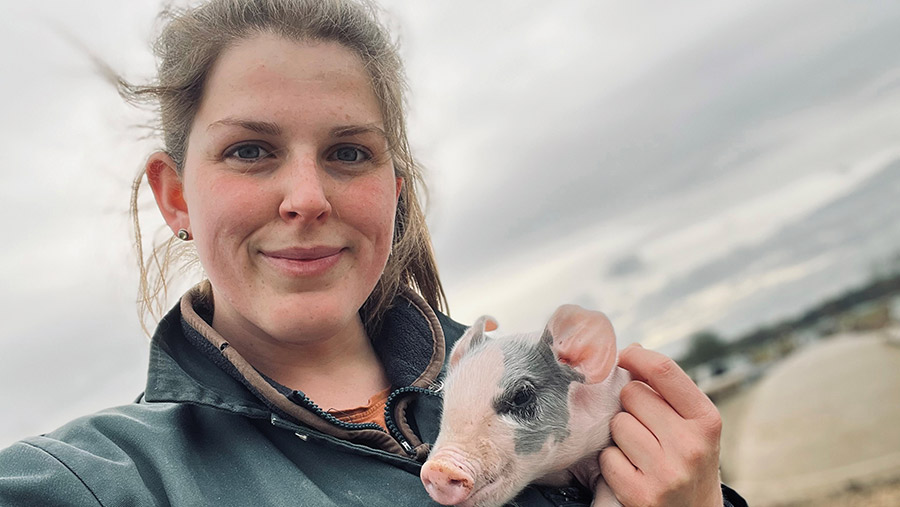Farming careers: Working as a pig stockperson
 © Bec Balaam
© Bec Balaam In the first of a new series focusing on key roles and career progression in farming, we look at working in the pig sector.
Find out what you need to get a job as a pig stockperson and hear from Bec Balaam who works on a 2,000-sow outdoor unit.
See also: How these young farmers got their farming jobs
What does the job involve?
Looking after animal welfare on a daily basis, feeding, farrowing and moving pigs, general husbandry, and record keeping.
What qualifications and/or experience are needed?
Hands-on experience is useful. Contact a pig farmer and ask if there is any weekend or relief work available.
Once you know this job is for you, you can go to an agricultural college which has pigs, or to university.
Qualifications are beneficial, but not always crucial. A passion for animal care, a good can-do attitude and willingness to learn and progress are important.
How can you gain the necessary qualifications?
Either via college or university, an apprenticeship, learning on the job, or virtual learning packages through a body such as the AHDB (which has recently launched a UK Pig Industry Welfare Training platform).
Remember to have a balance between technical, people management and finance training to ensure career progression.
What apprenticeships are available?
There are a number of apprenticeships that could lead to this role or assist with progression, such as livestock unit technician or assistant farm manager, which is being developed.
Agricultural colleges can offer industry-specific ones.
What would be a typical salary?
Entry level would be above the national minimum wage.
How can you progress from this role?
Gain a good understanding of pig production – the why as well as the how. Work on people management skills as well as pig knowledge. Be open to feedback and developing yourself.
Speak to your manager or the business owner and say you would like to move up.
Each unit is different – this could be to assistant herd manager or head of department. A good manager should recognise the best people and not want to lose them.
You might need to move on for a progression opportunity – part on good terms.
How can an employer best manage and maintain staff for this role?
Make sure you are or become an employer of choice. Build a reputation for being a progressive business that treats staff well.
The workforce and their expectations change constantly, so try and match as much as you can within your working environment.
Have regular staff appraisals and communicate what they are for and how they work. Keep a written record for accountability for both sides.
In almost all cases other factors are more important than just the salary, including:
- Flexible working hours
- Additional benefits on top of salary, such as health insurance
- Being given responsibility for a certain area
- Continual development and training
- Progression opportunities
- High standard working facilities and environment
- An employer who is happy to hear staff feedback and act upon this where appropriate
- Making sure the team understand and have bought into the vision and ethos of the business
- Regular updates and good communication
- Transparency about what is or is not going well in the business.
Source: AHDB pork knowledge exchange team and senior manager Izak Van Heerden
Case study: Stockperson Bec Balaam
Bec Balaam, 26, works on a 2,000-sow outdoor unit near Weeting, Norfolk, focusing on the farrowing side of the herd.
Her family is in farming and she first worked on pig units during her Year 10 school work experience and while she was studying animal care and management at Otley College.
Bec was originally working as a manager at a boarding kennels before being furloughed during the pandemic, which resulted in her coming back to agriculture.
“Fortunately the pandemic and the lockdown didn’t really affect pig farming,” she says.
“I always enjoyed it before during work experience and helping out during my days off and I had that background in it so I knew I could do it.”
She began her present role in August last year, after a yard visit and interview with the farm manager.
Across the business she is one of eight stockworkers, who report to the unit manager.
She has a lot of responsibility in the farrowing side, for which her previous experience was essential, but she says it would be possible for someone joining at an entry level to be trained on the job.
Her day starts at 6am, feeding the animals and assessing the sows and any new-born litters, before carrying out routine husbandry such as checking for signs of tail biting.
Depending on the day and season, she will then wean piglets or move in the next batch, and straw up or make wallows for the sows to cool down, before finishing at 2.30-3pm.
Bec is also completing the AHDB Stockperson Development Scheme, which involves several half-days of training on optional topics spread across the course of a year.
“I’ve always enjoyed working with animals and it’s a nice feeling to see the stats increase and things like the farrowing numbers improve,” she says.
“I’d like to keep progressing and maybe one day be assistant manager or manager.”
